RECENT ARTICLES
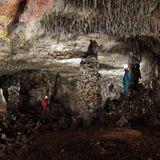
Neandertal DNA from cave mud shows two waves of migration across Eurasia
Neandertal DNA recovered from cave mud reveals that these ancient humans spread across Eurasia in two different waves.Analysis of suggests an early wave of Neandertals about 135,000 years ago may have been replaced by genetically and potentially anatomically distinct successors 30,000 years later, researchers report April 15 in Science. The timing of this later wave suggests potential links to climate and environmental shifts.By extracting genetic material from mud, “we can get human DNA from people who lived in a cave without having to find their remains, and we can learn interesting...…Neandertal DNA recovered from cave mud reveals that these ancient humans spread across Eurasia in two different waves.Analysis of suggests an early wave of Neandertals about 135,000 years ago may have been replaced by genetically and potentially anatomically distinct successors 30,000 years later, researchers report April 15 in Science. The timing of this later wave suggests potential links to climate and environmental shifts.By extracting genetic material from mud, “we can get human DNA from people who lived in a cave without having to find their remains, and we can learn interesting...WW…
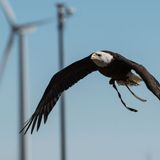
How researchers can keep birds safe as U.S. wind farms expand
Wind energy is surging in the United States. In 2020, turbines generated about — more than 80 times the share of wind-generated electricity in 2000 —according to the U.S. Energy Information Administration. While the growth is a positive step toward curbing climate change, scientists say, it could be bad news for birds.An estimated 140,000 to 500,000 birds die each year due to turbine collisions. Bird if the U.S. Department of Energy achieves its goal of expanding wind energy to 20 percent of the country’s electricity demand by 2030.To prevent avoidable deaths, some scientists are advocating...…Wind energy is surging in the United States. In 2020, turbines generated about — more than 80 times the share of wind-generated electricity in 2000 —according to the U.S. Energy Information Administration. While the growth is a positive step toward curbing climate change, scientists say, it could be bad news for birds.An estimated 140,000 to 500,000 birds die each year due to turbine collisions. Bird if the U.S. Department of Energy achieves its goal of expanding wind energy to 20 percent of the country’s electricity demand by 2030.To prevent avoidable deaths, some scientists are advocating...WW…

AI can predict which criminals may break laws again better than humans
Computeralgorithms can outperform people at predicting which criminals will getarrested again, a new study finds.Risk-assessmentalgorithms that often help judges and paroleboards decide who stays behind bars (SN: 9/6/17). But these systems havecome under fire for exhibiting (SN: 3/8/17), and someresearch has given reason to doubt that algorithms are any better at predictingarrests than humans are. One 2018 study that pitted human volunteers againstthe risk-assessment tool COMPAS found that people predicted criminal reoffence (SN: 2/20/18).Thenew set of experiments confirms that humans...…Computeralgorithms can outperform people at predicting which criminals will getarrested again, a new study finds.Risk-assessmentalgorithms that often help judges and paroleboards decide who stays behind bars (SN: 9/6/17). But these systems havecome under fire for exhibiting (SN: 3/8/17), and someresearch has given reason to doubt that algorithms are any better at predictingarrests than humans are. One 2018 study that pitted human volunteers againstthe risk-assessment tool COMPAS found that people predicted criminal reoffence (SN: 2/20/18).Thenew set of experiments confirms that humans...WW…

Surprisingly, humans recognize joyful screams faster than fearful screams
Screams of joy appear to be easier for our brains to comprehend than screams of fear, a new study suggests. The results add a surprising new layer to scientists’ long-held notion that our brains are wired to quickly recognize and respond to as a survival mechanism (SN: 7/16/15).The study looked at different scream types and how listeners perceive them. For example, the team asked participants to imagine “you are being attacked by an armed stranger in a dark alley” and scream in fear and to imagine “your favorite team wins the World Cup” and scream in joy. Each of the 12 participants...…Screams of joy appear to be easier for our brains to comprehend than screams of fear, a new study suggests. The results add a surprising new layer to scientists’ long-held notion that our brains are wired to quickly recognize and respond to as a survival mechanism (SN: 7/16/15).The study looked at different scream types and how listeners perceive them. For example, the team asked participants to imagine “you are being attacked by an armed stranger in a dark alley” and scream in fear and to imagine “your favorite team wins the World Cup” and scream in joy. Each of the 12 participants...WW…
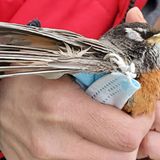
Discarded COVID-19 PPE such as masks can be deadly to wildlife
A Magellanic penguin in Brazil ingested a face mask. A hedgehog in England got itself entangled in a glove. An octopus off the coast of France was found seeking refuge under a mask.Wildlife and ecosystems around the world are suffering from , researchers warn March 22 in Animal Biology. Latex gloves and polypropylene masks which protect people from the coronavirus are exacerbating the when not disposed of properly and are causing wildlife deaths (SN:11/20/20). The study is the first global documentation of the impacts of COVID-19 litter on wildlife via entanglement, entrapment and...…A Magellanic penguin in Brazil ingested a face mask. A hedgehog in England got itself entangled in a glove. An octopus off the coast of France was found seeking refuge under a mask.Wildlife and ecosystems around the world are suffering from , researchers warn March 22 in Animal Biology. Latex gloves and polypropylene masks which protect people from the coronavirus are exacerbating the when not disposed of properly and are causing wildlife deaths (SN:11/20/20). The study is the first global documentation of the impacts of COVID-19 litter on wildlife via entanglement, entrapment and...WW…
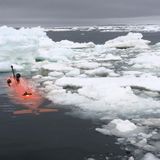
A trek under Thwaites Glacier’s ice shelf reveals specific risks of warm water
The under-ice trek of an autonomous underwater vehicle is giving scientists their first direct evidence for the stability of Antarctica’s vulnerable Thwaites Glacier. These new data will ultimately help scientists more accurately project the fate of the glacier — how quickly it is melting and retreating inland, and how far it might be from complete collapse, the team reports April 9 in Science Advances.“We know there’s a sick patient out there, and it’s not able to tell us where it hurts,” says Eric Rignot, a glaciologist at the University of California, Irvine who was not involved in the...…The under-ice trek of an autonomous underwater vehicle is giving scientists their first direct evidence for the stability of Antarctica’s vulnerable Thwaites Glacier. These new data will ultimately help scientists more accurately project the fate of the glacier — how quickly it is melting and retreating inland, and how far it might be from complete collapse, the team reports April 9 in Science Advances.“We know there’s a sick patient out there, and it’s not able to tell us where it hurts,” says Eric Rignot, a glaciologist at the University of California, Irvine who was not involved in the...WW…
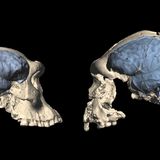
Ancient humans may have had apelike brains even after leaving Africa
Even after ancient humans took their first steps out of Africa, they still unexpectedly may have possessed brains more like those of great apes than modern humans, a new study suggests.For decades, scientists had thought modern humanlike organization of brain structures evolved soon after the human lineage Homo arose (SN: 3/4/15). But an analysis of fossilized human skulls that retain imprints of the brains they once held now suggests such brain development occurred much later. in an evolutionary sprint starting about 1.7 million years ago, researchers report in the April 9 Science.What...…Even after ancient humans took their first steps out of Africa, they still unexpectedly may have possessed brains more like those of great apes than modern humans, a new study suggests.For decades, scientists had thought modern humanlike organization of brain structures evolved soon after the human lineage Homo arose (SN: 3/4/15). But an analysis of fossilized human skulls that retain imprints of the brains they once held now suggests such brain development occurred much later. in an evolutionary sprint starting about 1.7 million years ago, researchers report in the April 9 Science.What...WW…

Yawning helps lions synchronize their groups’ movements
Watch a group of lions yawn, and it may seem like nothing more than big, lazy cats acting sleepy, but new research suggests that these yawns may be subtly communicating some important social cues. Yawning is not only contagious among lions, but it appears to help the , researchers report March 16 in Animal Behaviour. The discovery was partially made by chance, says Elisabetta Palagi, an ethologist at the University of Pisa in Italy. While studying play behavior in spotted hyenas in South Africa, she and colleagues often had the opportunity to watch lions (Panthera leo) at the same...…Watch a group of lions yawn, and it may seem like nothing more than big, lazy cats acting sleepy, but new research suggests that these yawns may be subtly communicating some important social cues. Yawning is not only contagious among lions, but it appears to help the , researchers report March 16 in Animal Behaviour. The discovery was partially made by chance, says Elisabetta Palagi, an ethologist at the University of Pisa in Italy. While studying play behavior in spotted hyenas in South Africa, she and colleagues often had the opportunity to watch lions (Panthera leo) at the same...WW…
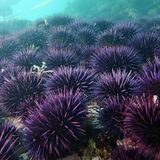
How kelp forests off California are responding to an urchin takeover
Joshua Smith has been diving in kelp forests in Monterey Bay along the central coast of California since 2012. Back then, he says, things looked very different. Being underwater was like being in a redwood forest, where the kelp was like “towering tall cathedrals,” says Smith, an ecologist at the University of California, Santa Cruz. Their tops were so lush that it was hard to maneuver a boat across them.No longer. The once expansive kelp forests are now a mosaic of thinner thickets interspersed with barrens colonized by sea urchins. And those sea urchins have so little to eat, — which...…Joshua Smith has been diving in kelp forests in Monterey Bay along the central coast of California since 2012. Back then, he says, things looked very different. Being underwater was like being in a redwood forest, where the kelp was like “towering tall cathedrals,” says Smith, an ecologist at the University of California, Santa Cruz. Their tops were so lush that it was hard to maneuver a boat across them.No longer. The once expansive kelp forests are now a mosaic of thinner thickets interspersed with barrens colonized by sea urchins. And those sea urchins have so little to eat, — which...WW…
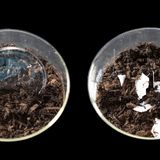
A new technique could make some plastic trash compostable at home
A pinch of polymer-munching enzymes could make biodegradable plastic packaging and forks truly compostable.With moderate heat, enzyme-laced films of the plastic within days to weeks, Ting Xu and her colleagues report April 21 in Nature.“Biodegradability does not equal compostability,” says Xu, a polymer scientist at the University of California, Berkeley and Lawrence Berkeley National Laboratory. She often finds bits of biodegradable plastic in the compost she picks up for her parents’ garden. Most biodegradable plastics go to landfills, where the conditions aren’t right for them to break...…A pinch of polymer-munching enzymes could make biodegradable plastic packaging and forks truly compostable.With moderate heat, enzyme-laced films of the plastic within days to weeks, Ting Xu and her colleagues report April 21 in Nature.“Biodegradability does not equal compostability,” says Xu, a polymer scientist at the University of California, Berkeley and Lawrence Berkeley National Laboratory. She often finds bits of biodegradable plastic in the compost she picks up for her parents’ garden. Most biodegradable plastics go to landfills, where the conditions aren’t right for them to break...WW…